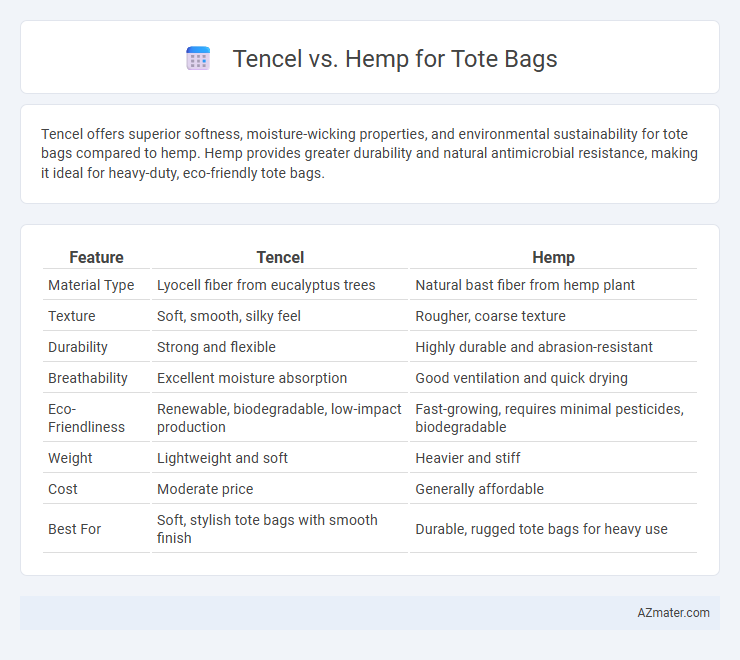Tencel offers superior softness, moisture-wicking properties, and environmental sustainability for tote bags compared to hemp. Hemp provides greater durability and natural antimicrobial resistance, making it ideal for heavy-duty, eco-friendly tote bags.
Table of Comparison
| Feature | Tencel | Hemp |
|---|---|---|
| Material Type | Lyocell fiber from eucalyptus trees | Natural bast fiber from hemp plant |
| Texture | Soft, smooth, silky feel | Rougher, coarse texture |
| Durability | Strong and flexible | Highly durable and abrasion-resistant |
| Breathability | Excellent moisture absorption | Good ventilation and quick drying |
| Eco-Friendliness | Renewable, biodegradable, low-impact production | Fast-growing, requires minimal pesticides, biodegradable |
| Weight | Lightweight and soft | Heavier and stiff |
| Cost | Moderate price | Generally affordable |
| Best For | Soft, stylish tote bags with smooth finish | Durable, rugged tote bags for heavy use |
Introduction to Tencel and Hemp Fabrics
Tencel is a sustainable fabric made from eucalyptus wood pulp, known for its softness, breathability, and moisture-wicking properties, making it ideal for durable and comfortable tote bags. Hemp fabric is derived from the fibers of the hemp plant, celebrated for its strength, resistance to wear and tear, and natural antibacterial qualities, which ensure long-lasting, eco-friendly tote bags. Both materials offer environmentally friendly alternatives to conventional fabrics, combining functionality with sustainability in tote bag production.
Environmental Impact: Tencel vs Hemp
Hemp is renowned for its low environmental impact, requiring minimal water and pesticides, and it regenerates soil health during cultivation. Tencel, derived from sustainably managed eucalyptus forests, uses a closed-loop production process that recycles water and solvents, significantly reducing pollution. Both materials represent eco-friendly choices, but hemp's natural resilience and soil benefits often position it as the greener option for tote bags.
Durability and Strength Comparison
Tencel tote bags offer moderate durability with a smooth texture, making them resistant to tears and stretching, though they may wear faster under heavy loads compared to hemp. Hemp bags are renowned for superior strength and longevity, with fibers that are naturally robust, abrasion-resistant, and capable of supporting heavier weights without deformation. For long-term use and maximum durability, hemp tote bags outperform Tencel, especially in demanding environments or frequent heavy carrying.
Comfort and Feel: Which is Softer?
Tencel offers a smooth, silky texture that feels exceptionally soft against the skin, making it highly comfortable for tote bags. Hemp tends to be coarser initially but softens with use and washing, providing a durable yet slightly rougher feel. For those prioritizing immediate softness and gentle touch, Tencel outperforms hemp in comfort and feel.
Breathability and Moisture Management
Tencel fibers offer superior breathability due to their smooth surface and porous structure, enhancing airflow in tote bags and keeping contents dry. Hemp features excellent moisture-wicking properties, absorbing excess humidity while remaining quick-drying, which helps prevent odor buildup. Both materials excel in moisture management, but Tencel provides a softer touch, whereas hemp is more durable and eco-friendly.
Style and Aesthetic Differences
Tencel tote bags offer a smooth, luxurious finish with a subtle sheen that enhances a modern, minimalist aesthetic, making them ideal for sleek, contemporary styles. Hemp tote bags present a coarse, textured surface with a natural, earthy look, appealing to those who prefer rustic, eco-friendly designs. While Tencel emphasizes elegance and softness, hemp highlights durability and organic charm, providing distinct stylistic choices for tote bag enthusiasts.
Ease of Care and Maintenance
Tencel tote bags offer superior ease of care due to their wrinkle resistance and ability to dry quickly, requiring minimal ironing and simple machine washing. Hemp tote bags, while durable and naturally resistant to pests, may require more frequent rinsing to prevent stiffness and benefit from air drying to maintain their shape and texture. Choosing Tencel reduces maintenance time, whereas hemp demands occasional conditioning to preserve softness and longevity.
Price and Cost Analysis
Tencel tote bags typically cost more than hemp bags due to the advanced lyocell fiber production process that demands higher energy and raw material inputs. Hemp tote bags are generally more affordable, benefiting from faster crop growth rates and lower water usage, which reduce overall cultivation expenses. When considering cost-efficiency, hemp offers a sustainable, budget-friendly option, whereas Tencel provides a premium, softer texture at a higher price point.
Sustainability and Ethical Considerations
Tencel, made from sustainably sourced eucalyptus wood pulp, utilizes a closed-loop production process that recycles water and solvents, significantly reducing environmental impact compared to conventional fabrics. Hemp requires minimal water, pesticides, and fertilizers, making it one of the most eco-friendly crops, and its fibers are biodegradable and highly durable, contributing to long-lasting tote bags. Both materials offer ethical advantages with lower ecological footprints, but hemp's ability to regenerate soil and its minimal chemical requirements give it a strong edge in sustainable textile production.
Final Verdict: Best Choice for Tote Bags
Tencel offers a smooth, lightweight, and eco-friendly option for tote bags with excellent durability and a soft feel, making it ideal for everyday use. Hemp stands out for its exceptional strength, natural resistance to wear and tear, and biodegradability, providing a robust and sustainable choice for heavy-duty tote bags. For a balance of comfort, sustainability, and durability, hemp is the best choice for tote bags intended for long-term use and environmental impact.

Infographic: Tencel vs Hemp for Tote Bag
 azmater.com
azmater.com